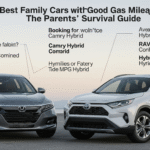
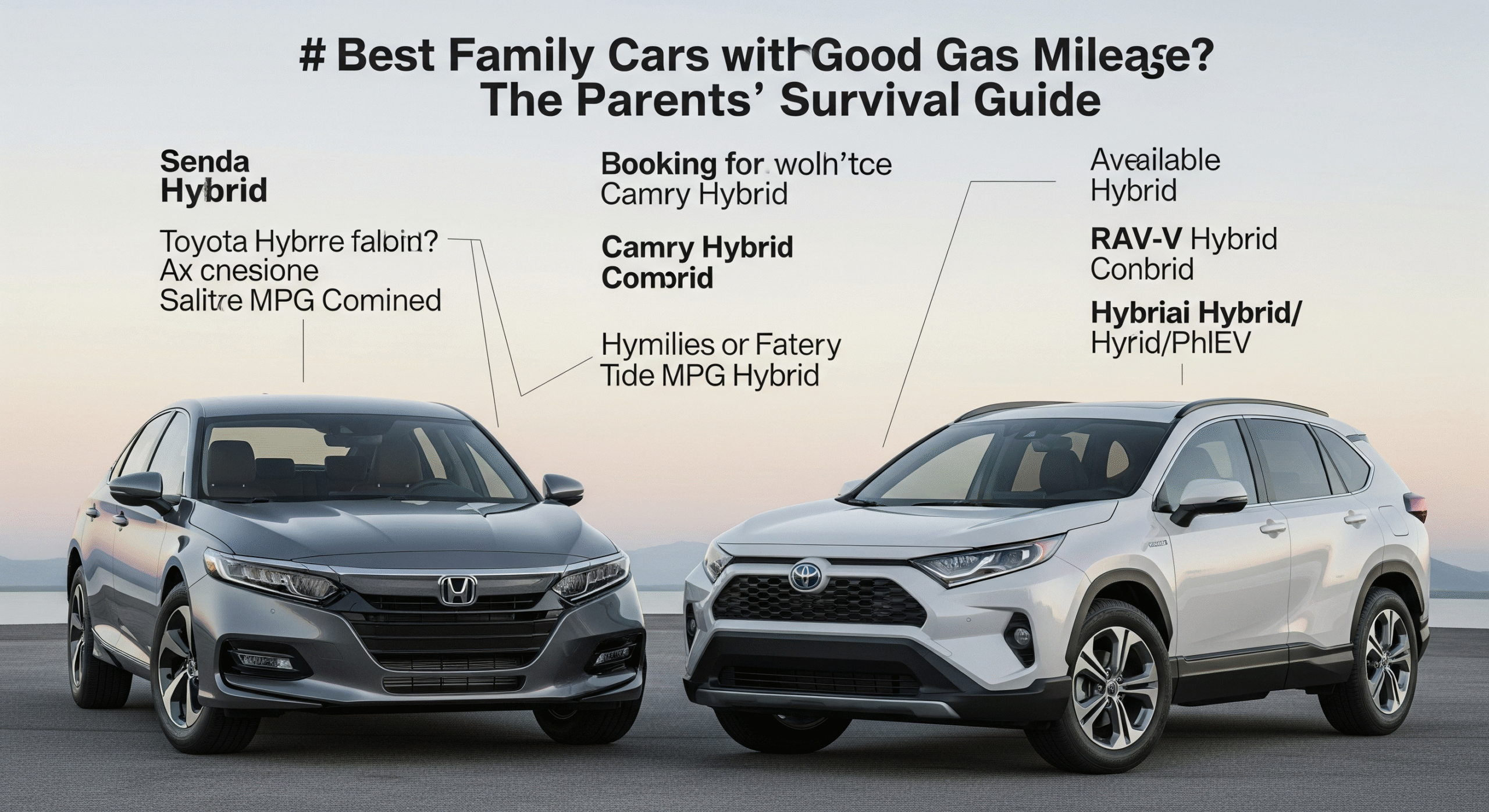
Best Family Cars with Good Gas Mileage: The Parent’s Survival Guide
How to buy a reliable used car becomes critical when you’ve got kids to ferry around and fuel bills that make you weep.
I remember staring at my petrol receipt after filling up my old Mondeo estate. £87. For one tank. With three kids and a dog, I was at the pump twice a week. That’s when I realised something had to change.
Fast forward two years, and I’m driving a hybrid that costs me half as much to run. The kids still fight in the back, but at least my wallet isn’t crying anymore.
Here’s what I’ve learned about finding the best family cars with good gas mileage that won’t leave you broke or stranded.
Why Family Car Fuel Economy Actually Matters More Than You Think
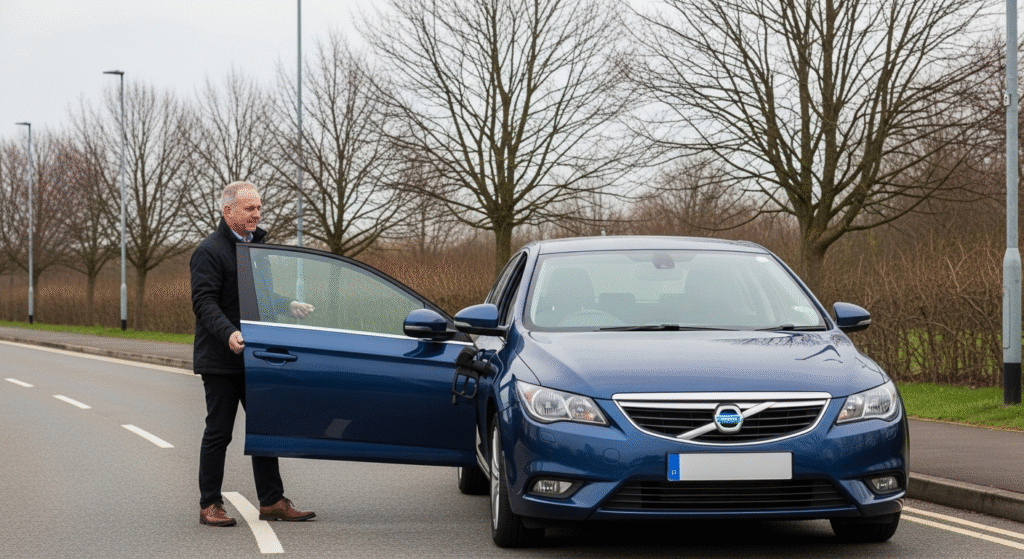
Let me paint you a picture. School run: 6 miles each way. Football practice: 8 miles. Grandparents: 45 miles. Weekly shop: 12 miles round trip. Random kid emergencies: countless.
The average family drives 12,000 miles per year. In a car doing 30mpg, that’s 400 gallons of petrol. At £1.45 per litre (£6.59 per gallon), you’re looking at £2,636 annually.
Switch to a car doing 60mpg? Same miles = 200 gallons = £1,318 per year. That’s £1,318 back in your pocket. Every single year.
Multiply that over the 5-7 years you’ll own the car, and you’re talking serious money. Money that could go towards holidays, house improvements, or your kid’s university fund.
What Makes a Great Family Car (Beyond Just MPG)
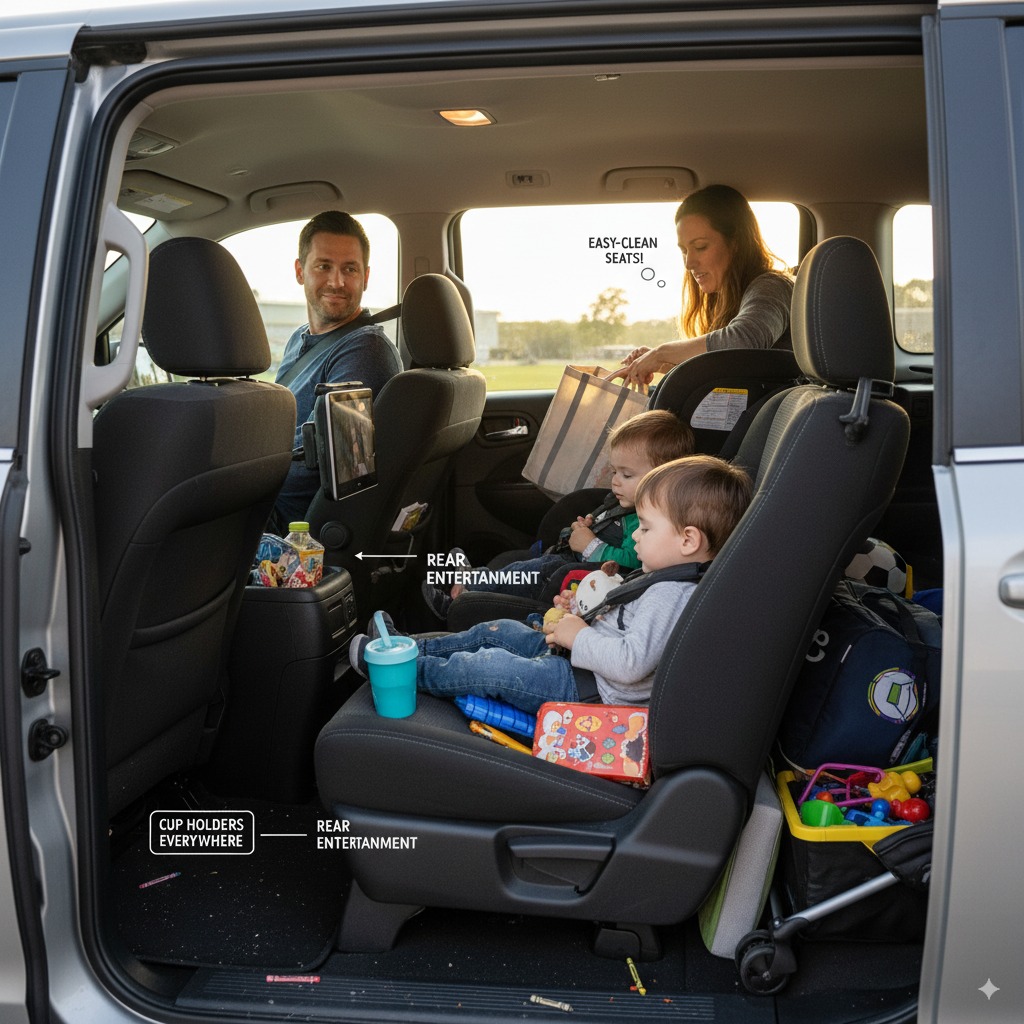
Before we dive into the best family cars with good gas mileage, let’s talk about what actually matters when you’ve got kids.
Non-negotiable family car features:
- Five proper seats (not three tiny ones in the back)
- Big boot for prams, sports bags, and random kid stuff
- Easy-access doors (sliding doors are brilliant for tight car parks)
- Simple controls (you don’t want to fiddle with touchscreens whilst driving)
- Reliable (breaking down with kids is not fun)
Nice-to-have features:
- Cup holders everywhere (trust me on this)
- Storage compartments for snacks and toys
- Rear entertainment screens (sanity savers on long journeys)
- Easy-clean seats (because kids are messy)
The fuel economy bit: Real-world MPG matters more than official figures. Those lab-tested numbers are fantasy. Look for cars that actually deliver good economy in stop-start traffic and school run conditions.
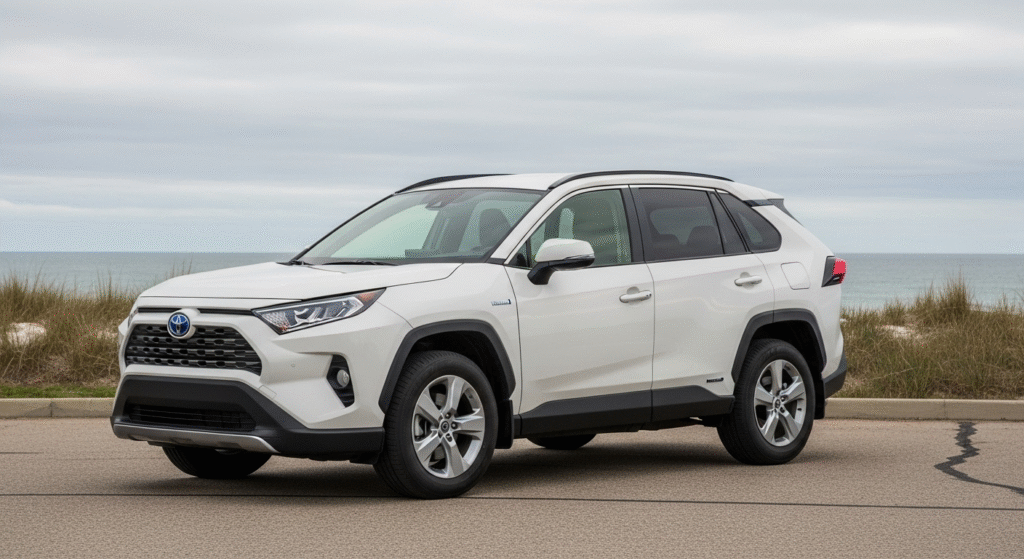
The Top 10 Best Family Cars with Good Gas Mileage
After driving, researching, and talking to other parents, here are the cars that actually work.
1. Toyota Prius+ (7-Seater Hybrid)
Real-world MPG: 55- 60 mpg. Why it works: Seven seats, massive boot, bulletproof reliability
I know what you’re thinking. “It looks like a spaceship.” You’re right. But when you’re spending £50 less per week on fuel, you stop caring about looks.
Pros:
- Genuinely good fuel economy in traffic
- Toyota reliability (these things run forever)
- Lots of space for people and stuff
- Low road tax (often free)
Cons:
- Looks divisive
- Road noise at motorway speeds
- CVT gearbox takes getting used to
Best for: Families who prioritise economy over style
2. Honda CR-V Hybrid
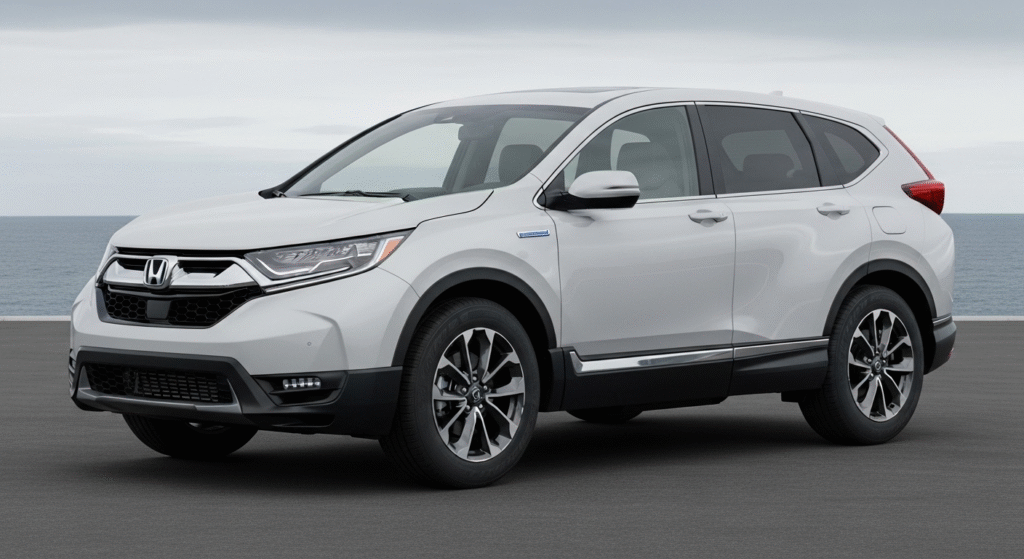
Real-world MPG: 45- 50 mpg. Why it works: SUV practicality with hybrid efficiency
This is what I drive now. Replaced my old petrol SUV and immediately halved my fuel costs. Still feels like a proper car, not an eco-penalty box.
Pros:
- High driving position (great for visibility)
- Massive boot space
- Honda’s reliability reputation
- Proper 4WD when you need it
Cons:
- More expensive than smaller cars
- Not as efficient as pure hybrids
- Can feel sluggish fully loaded
Best for: Families who need SUV space but want a hybrid economy
3. Skoda Octavia Estate 1.0 TSI
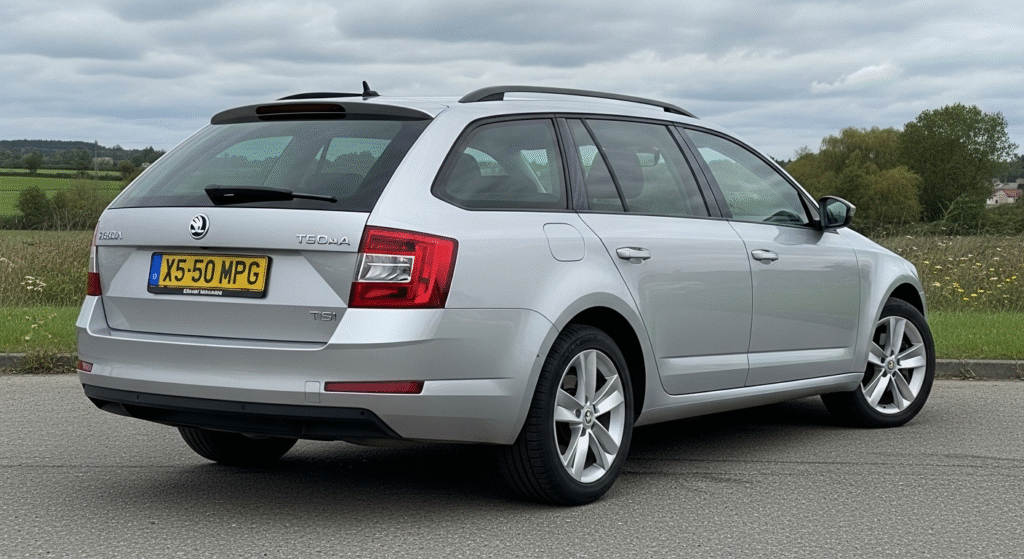
Real-world MPG: 45-50mpg Why it works: Huge boot, sensible running costs, VW Group quality
The Octavia estate is basically a really good car that nobody talks about. Which keeps used prices reasonable.
Pros:
- Enormous boot (bigger than some SUVs)
- Excellent build quality
- Comfortable for long journeys
- Reasonable insurance costs
Cons:
- Not the most exciting to drive
- Interior feels a bit austere
- 1.0-litre can struggle when fully loaded
Best for: Families who want maximum space for minimum money
4. Toyota RAV4 Hybrid
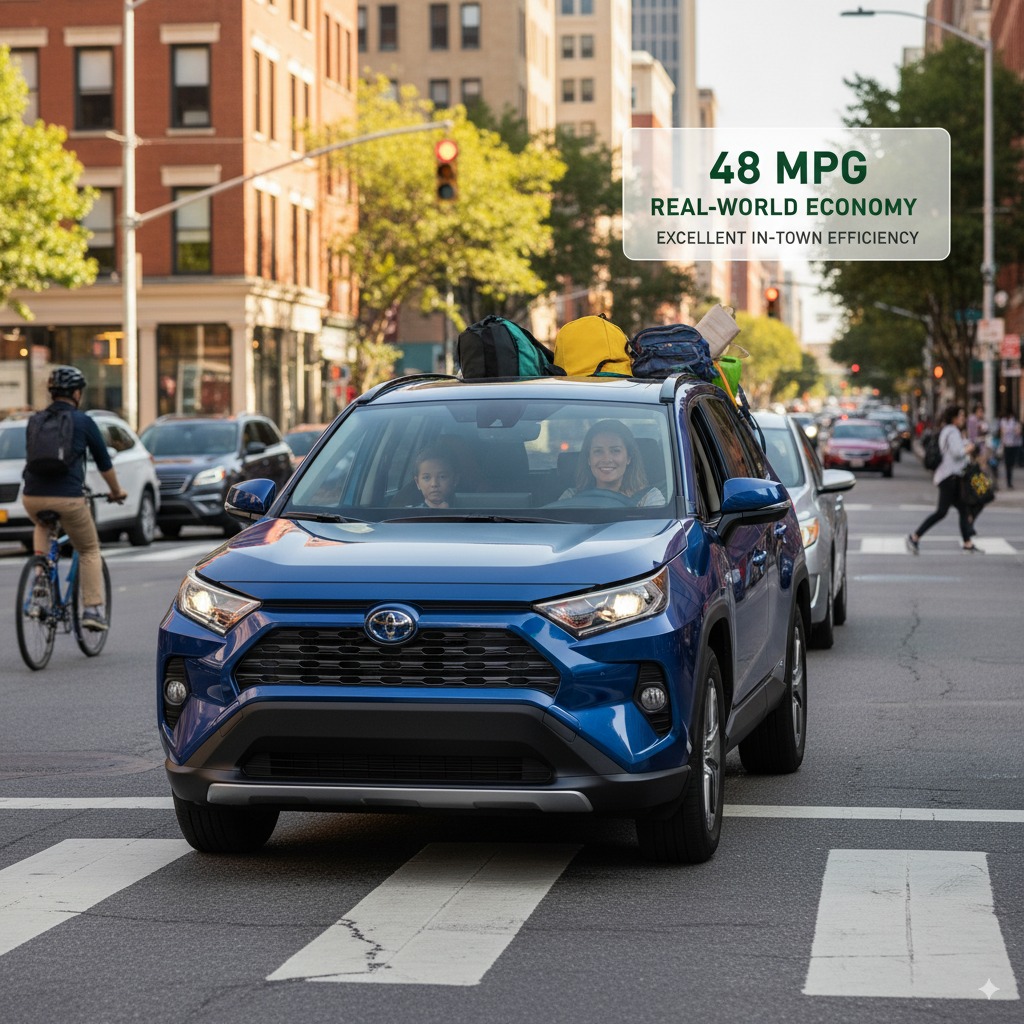
Real-world MPG: 45- 55 mpg. Why it works: SUV that actually delivers the promised economy
More expensive than the CR-V but noticeably better on fuel. Especially in town driving, where the electric motor does most of the work.
Pros:
- Excellent real-world fuel economy
- High reliability scores
- Good resale value
- Standard 4WD
Cons:
- Premium pricing
- Interior quality could be better
- Road noise on motorways
Best for: Families who can afford to buy efficiency
5. Volkswagen Golf SV 1.0 TSI
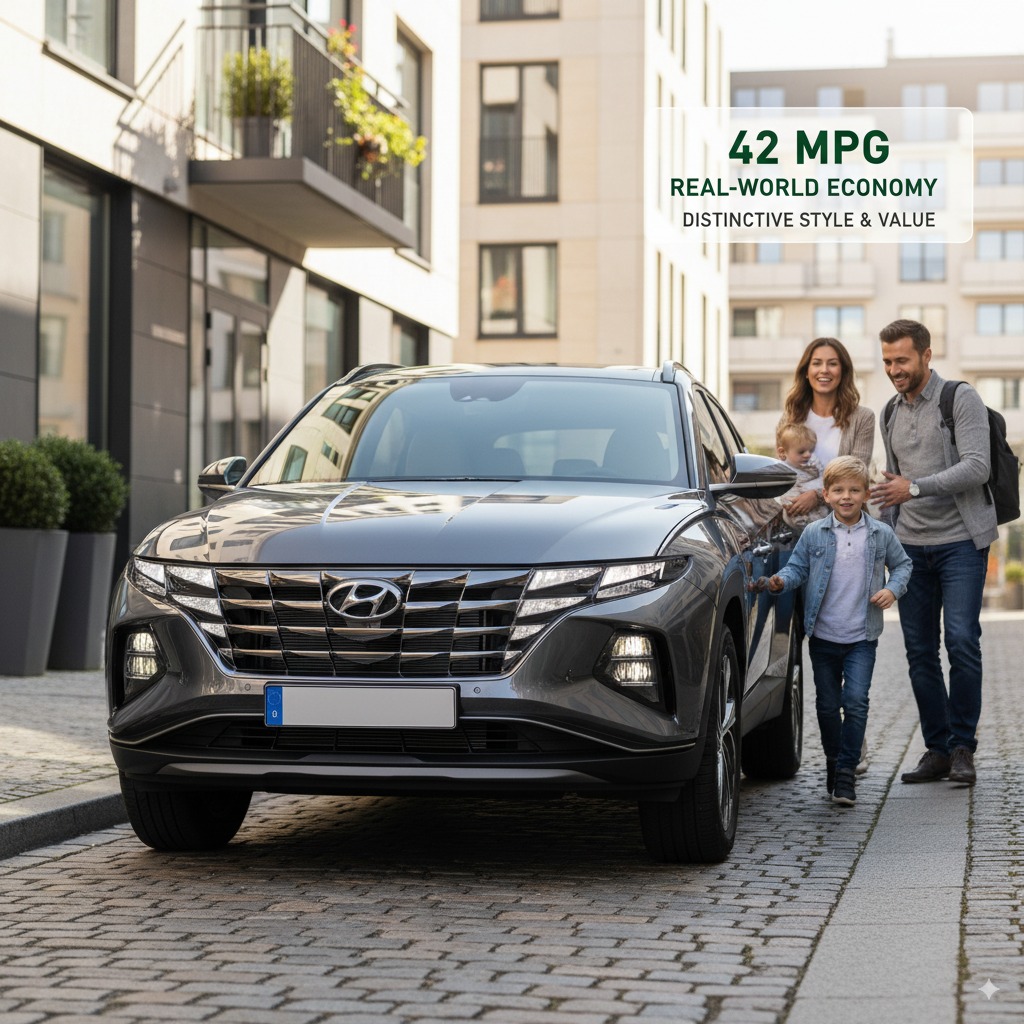
Real-world MPG: 45- 50 mpg. Why it works: Golf quality in a family-friendly package
It’s basically a Golf that’s been to the gym. Taller, more practical, but still drives like a Golf.
Pros:
- Easy to park (shorter than an estate)
- High seating position
- Quality interior
- Good handling for a family car
Cons:
- Smaller boot than estates
- VW prices (not cheap)
- Only five seats
Best for: Smaller families who want something premium
6. Hyundai Tucson Hybrid
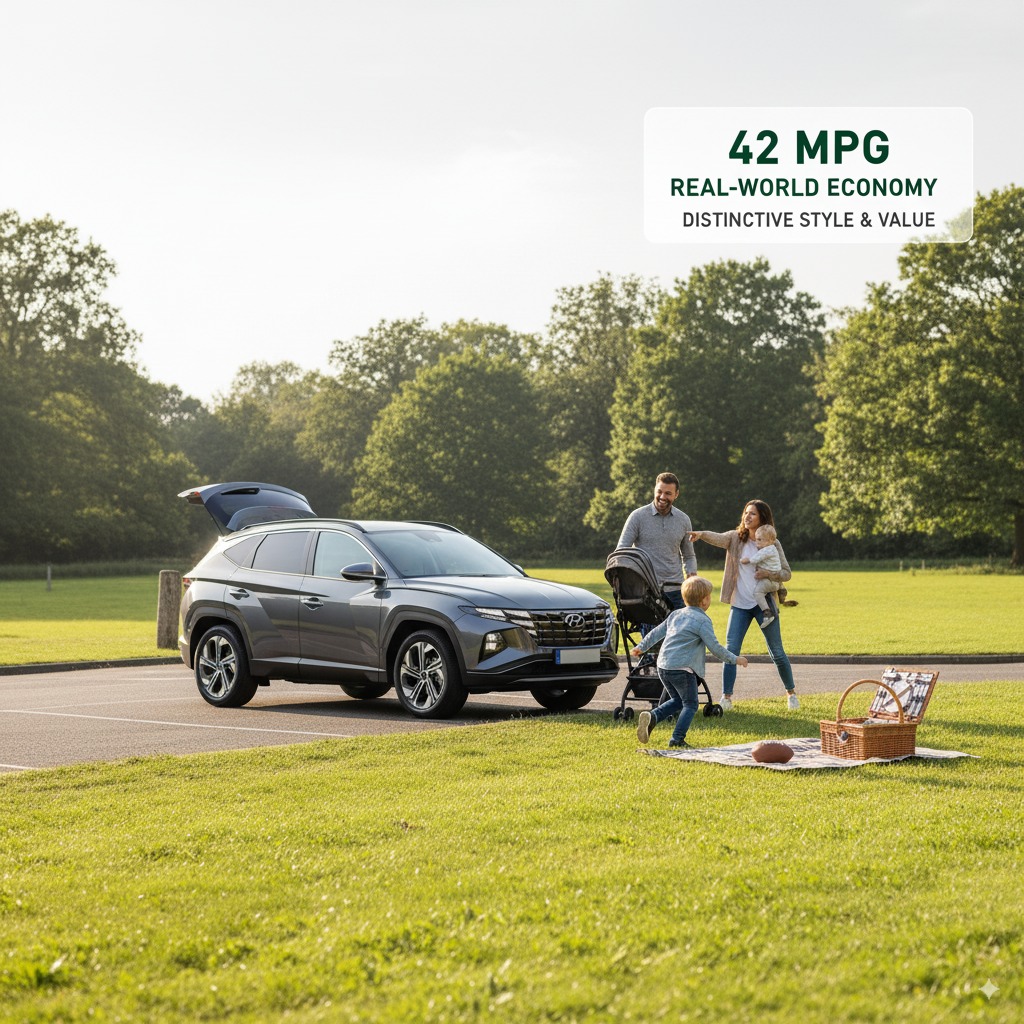
Real-world MPG: 40- 45 mpg. Why it works: Looks good, well-equipped, great warranty
Hyundai has really stepped up its game. This looks like a car costing twice the price.
Pros:
- Five-year warranty
- Loads of standard equipment
- Comfortable and quiet
- Distinctive styling
Cons:
- Not as efficient as Toyota rivals
- Interior quality variable
- Quite large for tight spaces
Best for: Families who want something that looks expensive
7. Ford Focus Estate 1.0 EcoBoost
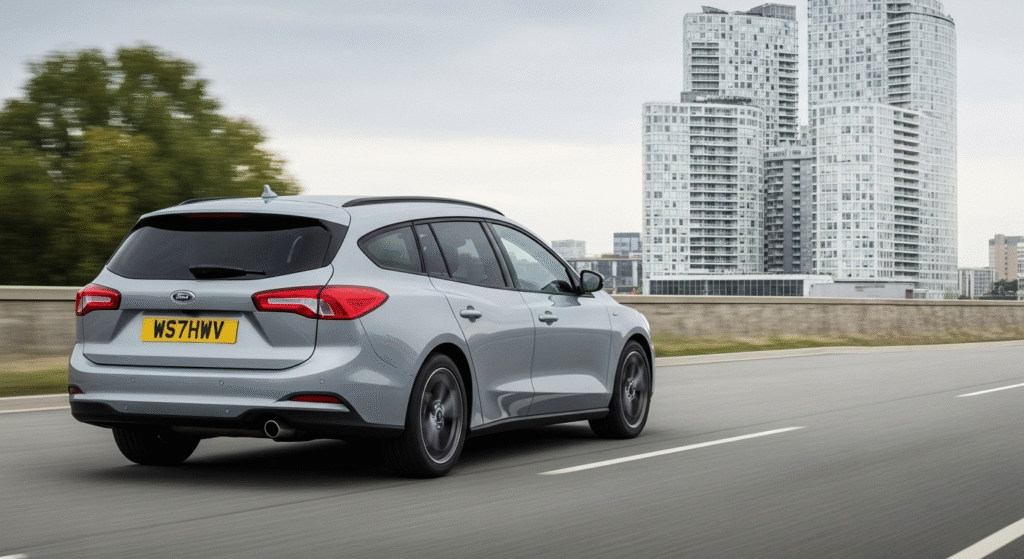
Real-world MPG: 40- 45 mpg. Why it works: Great to drive, practical, reasonable costs
The Focus estate is one of the best-driving family cars you can buy. Just happens to be quite efficient too.
Pros:
- Excellent handling
- Good boot space
- Proven reliability
- Reasonable running costs
Cons:
- Interior showing its age
- 1.0-litre can be sluggish
- Ford’s infotainment is rubbish
Best for: Families who want something fun to drive
8. Kia Niro Hybrid
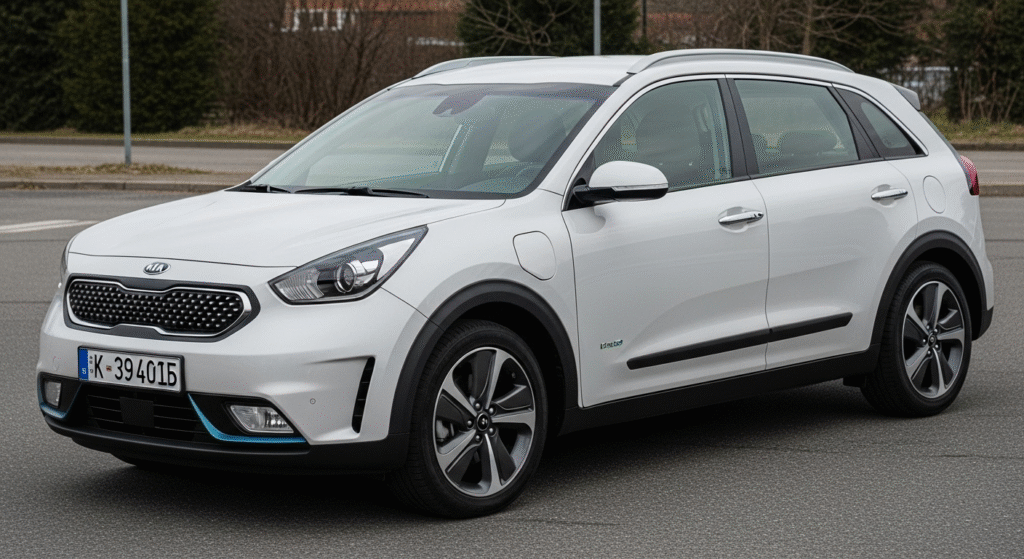
Real-world MPG: 50- 55 mpg. Why it works: SUV looks, hatchback economy, great warranty
It’s like Kia took all the good bits from other hybrids and put them in one car.
Pros:
- Excellent fuel economy
- Seven-year warranty
- Raised seating position
- Good value for money
Cons:
- Smaller than proper SUVs
- CVT gearbox feels strange
- Interior quality mixed
Best for: First-time hybrid buyers
9. Mazda CX-5 2.0 Skyactiv
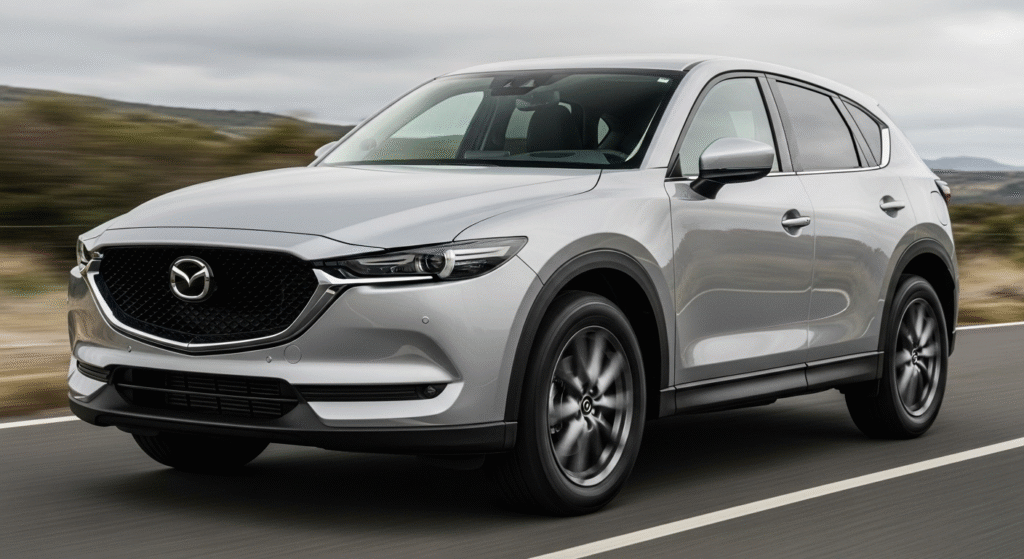
Real-world MPG: 40-45mpg Why it works: Best-looking SUV that’s also efficient
Not a hybrid, but Mazda’s Skyactiv engines are genuinely efficient. Plus it actually looks good.
Pros:
- Beautiful design
- Excellent build quality
- Great to drive
- Reliable
Cons:
- Smaller boot than rivals
- Premium fuel recommended
- Not cheap to buy
Best for: Families who refuse to compromise on style
10. Seat Alhambra 2.0 TDI
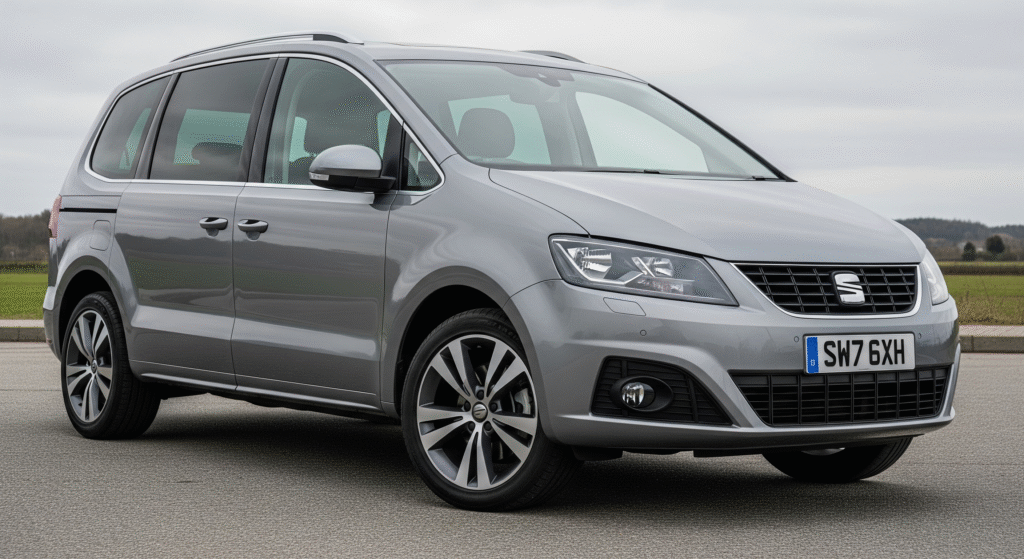
Real-world MPG: 45-50mpg Why it works: Seven proper seats, huge space, good economy
If you need to transport lots of people regularly, this is your answer. Diesel might be out of fashion, but it still makes sense for high-mileage families.
Pros:
- Seven full-size seats
- Massive boot space
- Sliding rear doors
- Excellent motorway economy
Cons:
- Large and hard to park
- Diesel reliability concerns
- Interior feels dated
Best for: Large families or those who need maximum space
Internal linking opportunity: Link to your SUV comparison guide or hybrid car reviews
Hybrid vs Petrol vs Diesel: What Actually Works for Families
The fuel type debate gets complicated with families. Here’s the reality.
Hybrid Cars
Best for: Stop-start driving, school runs, city work
Real talk: Hybrids shine in traffic. That’s exactly where families spend most of their time. School runs, shopping trips, crawling through town centres.
Downsides: More expensive to buy, complex systems, battery replacement fears.
Petrol Cars
Best for: Mixed driving, lower purchase prices, simplicity
Modern small petrol engines (1.0-1.4 litre) are surprisingly efficient. Especially if you’re not doing huge mileages.
Sweet spot: If you’re doing under 10,000 miles per year, petrol often makes most sense.
Diesel Cars
Best for: High-mileage families, motorway driving
The reality: Diesel is brilliant for motorway miles. But modern diesels hate short journeys. DPF problems, emissions worries, and rising fuel costs make them harder to recommend.
Only consider diesel if: You’re doing 15,000+ miles per year, mostly on faster roads.
The Hidden Costs That Kill Your Family Car Budget
MPG figures are just the start. Here are the costs that actually matter.
Insurance Groups
Family cars often fall into higher insurance groups. Check before you buy. That efficient hybrid might cost £300 more to insure than the petrol equivalent.
Road Tax (VED)
Pre-2017 cars: Often free or cheap road tax for efficient models Post-2017 cars: Most pay £165+ per year regardless of emissions Hybrids: Often get discounts in congestion zones
Servicing Costs
Hybrids: More complex, often more expensive to service Diesels: DPF cleaning, dual-mass flywheel replacements Petrol: Generally cheapest to maintain
Depreciation
The biggest cost for most family cars. Efficient cars often hold value better. But hybrids can depreciate quickly as technology moves fast.
Internal linking opportunity: Link to your car running costs calculator or depreciation guides
How to Actually Test Family Cars for Real-World Efficiency
Forget the official MPG figures. Here’s how to find cars that actually deliver good economy with kids on board.
The Real-World Test Drive
Take the kids: See how the car copes with full load Drive your actual routes: School run, supermarket, motorway Check the trip computer: Reset it and drive normally Test in traffic: This is where efficient cars shine
Questions to Ask:
- How does it feel when accelerating with passengers?
- Is the engine working hard on hills?
- Does it have enough power for safe overtaking?
- How’s the fuel economy display after 20 miles of mixed driving?
Red Flags:
- Struggling to maintain speed when loaded
- Constant gear changes on hills
- Trip computer showing way less than claimed MPG
- Engine noise suggesting it’s working too hard
The Best Places to Find Efficient Family Cars
Not all car sources are equal when hunting for efficient family cars.
Franchised Dealers
Best for: Approved used hybrids with warranties Pros: Proper preparation, comeback rights, financing options Cons: Higher prices, limited negotiation
Independent Dealers
Best for: Good value conventional cars Pros: Better prices, more negotiation room Cons: Variable preparation quality
Private Sales
Best for: Full service history, honest descriptions Pros: Best prices, complete history from owner Cons: No comeback, sold as seen
Online Specialists
Sites like Cazoo, Cinch, Heycar offer home delivery. Good for busy parents who can’t spend weekends car hunting.
Tip: Always insist on a proper test drive, even with home delivery services.
Internal linking opportunity: Link to your car buying guides or dealer vs private buying comparison
Financing Your Efficient Family Car
Family cars are expensive. Efficient ones often cost more upfront. Here are your options.
Cash Purchase
Best option if: You have the money and won’t miss it Pros: No interest, own it outright, better negotiation Cons: Big upfront cost, no protection if things go wrong
Personal Contract Purchase (PCP)
Best for: Families who want newer cars with warranties Pros: Lower monthly payments, optional final payment Cons: Mileage restrictions, condition requirements, never own it
Hire Purchase (HP)
Best for: Those who want to own the car eventually Pros: Own it at the end, no mileage restrictions Cons: Higher monthly payments than PCP
Personal Loans
Often cheapest for used cars over 3-4 years old. Shop around for rates. Sometimes better than dealer finance.
My recommendation: For reliable family cars over 3 years old, personal loans often work out cheapest overall.
Common Mistakes That Cost Families Thousands
I’ve made these errors. Learn from my pain.
Buying Too Much Car
That seven-seater looks amazing. But if you only use those extra seats twice a year, you’re paying for space you don’t need. Every day.
Ignoring Real-World Reviews
Official MPG figures are fantasy. Check What Car?, Auto Express, and owner forums for real-world economy figures.
Forgetting About Depreciation
That £25,000 hybrid loses £5,000 in the first year. Sometimes the £18,000 petrol car is actually cheaper overall.
Not Factoring in Usage Patterns
Bought a diesel for school runs? You’ll have DPF problems within 18 months. Bought a hybrid for motorway commuting? You’re not getting the benefit.
Choosing Style Over Substance
That beautiful crossover with 35mpg costs you £800 more per year than the boring estate with 50mpg. Over five years, that’s £4,000. Was the style worth it?
The Family Car Replacement Strategy
Most families get this backwards. They wait until their current car dies, then panic-buy.
The Smart Approach:
Year 1-3: Drive what you have, start researching Year 4-5: Begin serious car shopping, test driving Year 6+: Buy replacement before problems start
Signs It’s Time to Change:
- Repair costs exceeding £1,000 per year
- Fuel economy dropping noticeably
- Reliability concerns with kids on board
- Growing family needs more space
The key: Replace before you’re forced to. You get better deals when you’re not desperate.
Electric vs Hybrid: The Future-Proofing Dilemma
Electric cars are the future. But are they ready for family life today?
Electric Cars for Families:
Pros:
- Virtually free running costs
- Silent and smooth
- Instant acceleration
- Future-proofed against fuel price rises
Cons:
- Limited charging infrastructure for long trips
- Range anxiety with kids
- Higher purchase prices
- Unknown battery replacement costs
My Take:
If you rarely do long journeys: Electric makes sense If you need flexibility: Hybrid is still better For most families: Hybrid is the sweet spot right now
Internal linking opportunity: Link to your electric car family guide or charging infrastructure articles
Maintenance Tips for Maximum Efficiency
Getting good MPG isn’t just about the car. It’s about how you maintain and drive it.
Essential Maintenance for Efficiency:
Tyre pressures: Check monthly – low pressures kill economy Air filter: Clean filter = better breathing = better MPG Oil changes: Regular changes keep engines efficient Wheel alignment: Wonky wheels waste fuel
Driving Tips That Actually Work:
Smooth acceleration: Pretend there’s an egg under the pedal Anticipate traffic: Coast to red lights instead of braking hard Use cruise control: On motorways, it’s more efficient than your right foot Remove roof boxes: When not in use, they create drag
Load Management:
Empty the boot: Every 50kg costs you 2% efficiency Remove roof bars: When not needed Check tyre pressures: Especially when loaded for holidays
Frequently Asked Questions
What’s the most fuel-efficient family car you can buy?
The Toyota Prius+ consistently delivers 55-60mpg in real-world conditions. But it’s not the most practical or stylish option. For the best balance of efficiency and practicality, I’d recommend the Honda CR-V Hybrid or Toyota RAV4 Hybrid.
Are hybrid family cars reliable?
Toyota and Honda hybrids have excellent reliability records. The battery systems rarely fail and often outlast the rest of the car. European hybrids (from brands like Hyundai and Kia) are improving but don’t have the same long-term track record.
Should I buy diesel for a large family?
Only if you’re doing 15,000+ miles per year on longer journeys. Modern diesels hate short trips and can develop expensive DPF problems. For most families doing school runs and local trips, hybrid or efficient petrol is better.
How much money can good fuel economy actually save?
Switching from a 30mpg car to a 60mpg car saves about £1,300 per year based on 12,000 miles. Over five years of ownership, that’s £6,500 – often enough to pay for the more efficient car entirely.
What’s better for families – SUV or estate?
Depends on your priorities. SUVs offer higher driving position and perceived safety, but estates usually have more boot space and better fuel economy. If you must have SUV style, consider hybrid versions like the RAV4 or CR-V.
Do I need seven seats for a family of four?
Probably not permanently, but they’re useful for friends, grandparents, and as the kids grow. Consider how often you’d actually use them versus the extra cost and reduced fuel economy. Sometimes a large five-seater is more practical.
Are approved used hybrid cars worth the extra cost?
Yes, if they come with meaningful warranties on the hybrid system. Hybrid batteries can cost £3,000+ to replace, so warranty coverage is valuable. Just make sure the warranty actually covers hybrid components, not just conventional parts.
What mileage is too high for a hybrid family car?
Hybrid systems actually cope well with high mileage. The real concern is conventional wear items like suspension and brakes. I’d be comfortable buying a well-maintained hybrid with 80,000+ miles if the price reflected the mileage.
The bottom line on finding the best family cars with good gas mileage? It’s not just about the MPG numbers. It’s about finding something that works for your actual family life whilst keeping fuel costs reasonable.
That might be a boring but brilliant Prius+. It could be a stylish RAV4 Hybrid. Or maybe it’s a sensible Octavia estate with a small petrol engine.
The right answer depends on your family, your budget, and your priorities.
What matters is doing the research, understanding the real costs, and buying something you can live with for the next five years.
Because remember, how to buy a reliable used car that serves your family well is about finding the right balance between efficiency, practicality, and affordability – not just chasing the highest MPG figure you can find.
Internal linking opportunity: Link to your family car comparison tools, running cost calculators, or car buying checklists
Add a comment Cancel reply
Comments (0)
Buying a Used Car From a Private Seller - RealCarReviews
[…] see people buying sports cars when they need family haulers. Or massive 4x4s for city […]
Categories
- Auto Detailing (3)
- Car News (3)
- Car Reviews (3)
- Uncategorized (2)
Recent Posts
About us

Popular Tags
Related posts





